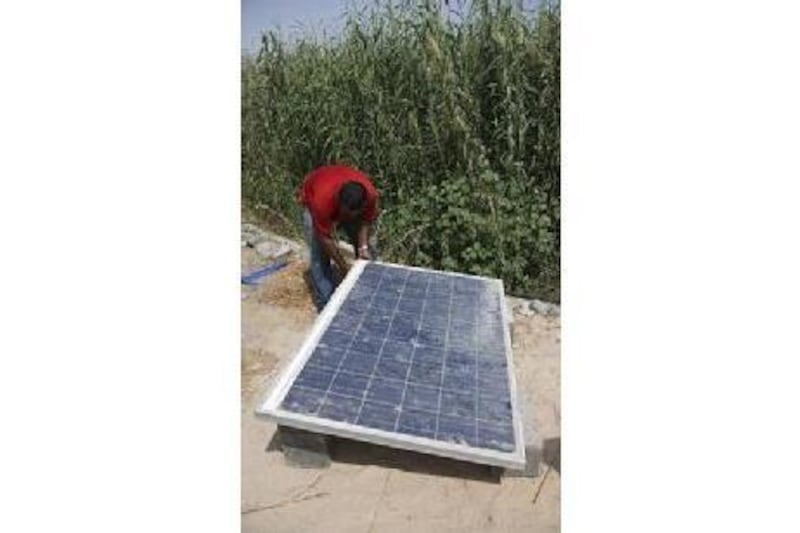DUBAI // Solar-power generation in the UAE is hampered by high temperatures and dust, but a German engineering firm based in Dubai may be on track to a solution.
Extreme summer heat reduces the efficiency of solar panel semi-conductors, which turn sunlight into energy, by up to two thirds. Dust hampers the process by obstructing the sun.
A German infrastructure consultancy, Waagner Biro Gulf, is tackling both issues by proposing that if the solar panels can be rinsed with water in an energy-efficient manner they can remain productive even during the summer. Their testing ground is in the Ras al Khor industrial area of Dubai.
When The National paid a visit to the site, Peter Neuschaefer, Waagner Biro's director of water, energy and environment, pointed to a 3.5-metre-high canopy of 64 solar panels, made into a makeshift fountain with a continuous flow of water. "It sounds as if it is raining," he said. The project would lack environmental credibility if the water was potable. In a country that relies on energy-intensive desalination plants, every drop comes with a carbon footprint large enough to render such an effort unsustainable.
But the liquid running off the solar panels is sewage, waste water that has been purified using a low-energy system mimicking processes that occur in nature. The water is cleaned by being run through a patch of common reeds; the bacteria living in the roots of the reeds feed on the organic pollutants. The plants are already helping to purify water simply by existing in marshes and lagoons all over the world. Waagner Biro Gulf has 18 such projects serving homes and developments in Dubai and the northern Emirates. The solar panels, however, are a new twist.
"Reed beds have been used to clean up sewage before, but this is the first time this process is coupled with solar-energy generation," Mr Neuschaefer said. "The advantage of this process is that water gets reused within the system, and this is very cost-effective." Mr Neuschaefer's 10-square-metre experimental patch builds on the reed system, adding a metre-deep layer of sand in the dirt under the reeds, and above, a plastic lining to protect the surrounding area, to help cool the water even more.
Three times a day, sewage and waste water produced by the 100 labourers who live on the Ras al Khor site, a total of 30 cubic metres a day, are flushed through the reeds. After the water is purified, it is sent to a nearby garden, where it is used to irrigate beans, tomatoes and watermelons, or to a second pond housing the solar canopy. The water circulates continuously through the system. Up at the surface of the first patch, any waste sludge left over dries out in the sun between the thrice-daily flushings, eliminating unpleasant smells.
The system was installed in May, and since then, Mr Neuschaefer has been exploring methods of cooling down the solar panels. So far, the best way appears to be using pipes that pump water through the system. The company's tests have shown that the flow of treated water cuts temperatures on the solar panels in half, from 80°C to 40°C. Once a cooling system has been chosen, the project's next step will involve connecting a battery to the system to store the generated electricity.
However, since the sale of green energy into Dubai's grid is not allowed, any power produced would have to be used on the company's premises. Waagner Biro Gulf is still seeking a patent for the process, but Mr Neuschaefer said it has already brought interest from a group of developers seeking to build a new mosque. While the innovation is still in the development stages, news of the idea earned a positive reaction from the UAE's main environmental group.
Success, however, will depend on how it could be applied, said Tanzeed Alam, sustainability and climate change manager at the Emirates Wildlife Society-World Wide Fund for Nature. "Any project that demonstrates the role of solar in providing a low-carbon source of energy is welcome and much needed in the UAE," he said. "However, the extent to which such a project can reduce the UAE's carbon footprint will depend on the scale and timescale over which it is implemented."





